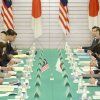TOKYO, Dec 16 — The just concluded working visit by Datuk Seri Najib Razak to Japan has not only enhanced the already strong bilateral ties with that country, but also provided the opportunity for Malaysia to explain the type of investment it wants.
The Prime Minister’s message, during his discussions with his Japanese counterpart Shinzo Abe as well the business community and captains of industry, was that Malaysia wanted future investment by Japanese companies to be higher up the value chain and focused on areas of high technology.
In other words, Malaysia does not want the labour intensive kind of investment of the past as the country today is considered an upper middle income country and moving towards developed nation status by 2020, Najib said.
Najib was here from Thursday until Saturday for a working visit in conjunction with the Asean-Japan Commemorative Summit marking the 40th anniversary of Asean-Japan dialogue relations held on Saturday.
Furthermore, the various transformation programmes such as the ETP being implemented under the leadership of Najib, who is also Finance Minister, is moving the nation towards creating more high technology industries.
High technology investment will not only benefit Malaysia but Japanese investors too as Japan is one of the top countries in the world in this rapidly changing field and they should not have any problem putting their money in this kind of investment in Malaysia.
Among the areas mentioned by the Prime Minister were green technology, renewable technology and waste disposal, areas in which Japan has vast expertise and experience.
This is also in line with the second wave of the Look East Policy which, according to the Prime Minister, is about the industries of the future: high-tech and low-carbon.
The confirmation by Tokuyama Corp during Najib’s visit that it would make a new RM5 billion investment to produce polycrystalline silicon for solar cells, in addition to its RM3 billion investment for the first phase, showed the confidence of the Japanese business community in the various transformation programmes being implemented under Najib.
Several other Japanese companies, including Sumitomo Corporation and Mitsui & Co Ltd, have also shown interest in participating in the proposed Kuala Lumpur-Singapore High Speed rail link.
The move by the Malaysian government to liberalise the services sector is also expected to attract keen interest from Japanese companies to invest in that sector, which has huge investment potential in Malaysia.
The Japanese business community’s confidence could also be attributed to the government’s sound economic and investment policies.
Najib during his visit had also assured the Japanese community that Malaysia would continue to implement investor-friendly policies and provide a conducive investment climate.
The Prime Minister had also outlined possible investment areas in the growing halal industry, the Greater Kuala Lumpur development and the economic corridors of the northern region and in Sabah.
According to International Trade and Industry Minister Datuk Seri Mustapa Mohamed, who was also here, to date the major Japanese investors in the Halal industry are Ajinomoto, Taisho and Kewpie.
He also explained that retail trade between Malaysia and Japan is on an increasing trend, growing from 5.5 per cent in 2012 to 6.2 per cent in 2013.
He also stressed that Malaysia was going all out to attract investments into high-end services in the manufacturing sector, including in research and development, design and development, software development, IP and industrial automation.
Both sides also have much to gain under the Second Wave of the Look East Policy in areas such as managing eco-systems with safe, reliable and renewable energies, tackling over-dependence on fossil fuels and improving water supply management as well as small and medium-sized enterprises (SMEs), areas where Japan has gained expertise over a long period.
Japan has been Malaysia’s largest foreign direct investor since the 1980s.
Last year, approved investments in the manufacturing sector alone totalled US$1 billion.
In 2011, total approved investment from Japan was RM10.1 billion, while in 2012 it was RM2.79 billion.
Japanese companies have made a strong contribution to Malaysia’s infrastructure development especially in the automotive sector, renewable energy, green and biotechnology industries.
It is clear that Malaysia-Japan bilateral ties—political, trade, economic and investment—are set to grow in years to come with Malaysia witnessing an era of transformation under Najib while Abenomics—the economic policies introduced by Abe, after assuming office about one year ago—is providing the necessary ingredients and impetus for change in that country’s economy.
-Bernama

